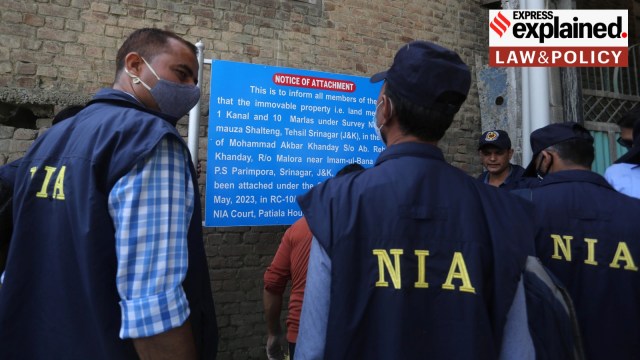Supreme Court expands the reach of NIA’s powers: What was the case?
The Supreme Court held that the NIA has the power to investigate offences “connected” to the main Scheduled Offence that is already under investigation — even if the connected offence was committed by a separate person who is not an accused in the Scheduled Offence
 The National Investigation Agency (NIA) was formed in the aftermath of the 26/11 terror attacks in Mumbai. (Express Photo by Shuaib Masoodi)
The National Investigation Agency (NIA) was formed in the aftermath of the 26/11 terror attacks in Mumbai. (Express Photo by Shuaib Masoodi)The Supreme Court earlier this week expanded the National Investigation Agency’s (NIA’s) powers of investigation.
A Bench of Justices B V Nagarathna and N K Singh held that the NIA has the power to investigate offences “connected” to the main Scheduled Offence that is already under investigation — even if the connected offence was committed by a separate person who is not an accused in the Scheduled Offence.
The National Investigation Agency Act, 2008 (NIA Act) allows the agency to investigate certain Scheduled Offences upon the direction of the Central Government. The NIA Act includes a list or “Schedule” of laws that contain offences that the NIA may investigate, including offences under the Unlawful Activities (Prevention) Act, 1967 (UAPA) and the Anti-Hijacking Act, 1982.
Here is why the above case came before the SC, and how the apex court expanded the NIA’s powers.
Facts of the case
In January 2020, an FIR was registered by a police Special Task Force in Mohali, Punjab against a man named Sukhbir Singh for the offences related to drug trafficking and illegal arms possession under the Narcotic Drugs and Psychotropic Substances Act, 1985 (NDPS Act). During interrogation, Singh stated that the car he was caught in belonged to one Ankush Vipan Kapoor. When the police arrested Kapoor from his shop, they found heroin, an illegal narcotic drug, at the location. He was granted bail by the Punjab & Haryana High Court in July 2021.
Parallel to this case, Sukhbir Singh has been under investigation in Gujarat since 2018 for allegedly smuggling and distributing 500 kgs of narcotics transported from Pakistan. In June 2020, the Ministry of Home Affairs (MHA) transferred the Gujarat investigation to the NIA. The NIA re-registered the case, and added the offences of conspiracy to raise funds for terrorist acts under Sections 17 and 18 of the UAPA, which are also Scheduled Offences under the NIA Act. The NIA then took custody of Sukhbir Singh from the Punjab Police after learning about his arrest. Singh once again named Kapoor as someone who was involved in drug smuggling activities.
In May 2023, the NIA moved the Punjab & Haryana HC to cancel the bail granted to Kapoor. The HC agreed, taking note of the 500 kg of heroin recovered in Gujarat and the link to Kapoor, stating that an investigation is required along with custodial interrogation. Kapoor approached the Supreme Court challenging both the bail cancellation order, and the MHA order transferring the investigation to the NIA.
What Kapoor & the Centre argued
Under Section 8 of the NIA Act, “While investigating any Scheduled Offence, the Agency may also investigate any other offence which the accused is alleged to have committed if the offence is connected with the Scheduled Offence”. This allows the NIA to investigate non-Scheduled Offences if it can show that there is a “connection” with the Scheduled Offence under investigation.
Before the SC, Kapoor argued that he was not being investigated for a Scheduled Offence under the NIA Act as offences under the NDPS Act are not included. He also argued that there was no link between the petitioner and the alleged crime committed in Gujarat, so the offences registered under the UAPA (which are Scheduled Offences) could not be invoked against him.
The Centre on the other hand, argued that the ongoing investigation into the Scheduled Offence under the UAPA was connected to the crime alleged against Kapoor in Gujarat. It argued that Kapoor is a part of a terror network smuggling drugs into Gujarat, and transporting them to Punjab for purification and further distribution. Further, it claimed that the link between Kapoor and Sukhbir Singh shows that Kapoor is also connected to the NIA’s investigation.
Supreme Court’s verdict
The court found no reason to interfere with either the bail cancellation order, nor the MHA’s order transferring the Gujarat investigation to the NIA.
The court acknowledged that the plain-meaning phrase “the accused” used in Section 8 of the NIA Act indicates that the NIA can only investigate connected offences committed by the particular accused under investigation — such as Sukhbir Singh in Gujarat. However, the court held that Section 8 must be given a “purposive and meaningful interpretation” that allows the NIA to investigate connected offences, even if a different person committed it.
The court clarified that “the nexus or connection between any other offence and the Scheduled Offence is of critical importance”, and that this connection must be present before the NIA can investigate any other offence committed by an accused in connection with the Scheduled Offence. In the present case, the court held that “there is a connection, nexus and a link” between the Scheduled Offences investigated by the NIA under Sections 17/18 of the UAPA, and the offences alleged against the Kapoor under the NDPS Act.
Kerala HC on “connection” with Scheduled offence
The Kerala High Court in December 2023 had expanded on how this “connection” with a Scheduled Offence can be understood in a case involving the murder of an RSS and BJP activist. The police concluded that members of the Popular Front of India (before it was declared an unlawful association under the UAPA in September 28, 2022) had conspired to murder the activist.
The investigation continued even after this finding, and it was eventually transferred to the NIA on September 16, 2022, based on allegations that “office bearers and activists of PFI and its affiliates in Kerala have conspired to instigate communal violence and radicalise its cadres to commit terrorist acts in the State and various other parts of the country”, according to the judgment. In December, the NIA filed a report claiming that the murder was a part of a larger conspiracy hatched by senior PFI leaders and levied charges under the UAPA.
The petitioners, the PFI members accused in the murder case, argued that the initial murder case could not have been investigated by the NIA as there was no connection between the murder and the Scheduled Offence under the UAPA. The HC held however, that this connection must be considered with a “wider perspective”, and stated that the PFI leaders had been named as accused persons in both the murder case and the Scheduled Offence under the UAPA and the two have to be considered connected offences.
- 01
- 02
- 03
- 04
- 05






































